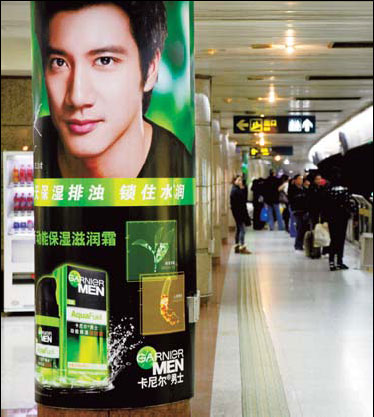 |
|
A subway station in a Shanghai features advertisements for Garnier men's moisturizer, a brand belonging to the L'Oreal group. L'Oreal aims to double the number of people using its products by 2020. [Photo / Bloomberg News] |
Sales in China in 2010 rose to 9.085 billion yuan ($1.38 billion), an 11.1 percent increase over the previous year, and a double-digit gain for the 10th consecutive year.
The world's largest cosmetic group aims to gain one billion new consumers globally in the coming few years, doubling its current number. Around half of those will reside in Asian countries, according to Alexis Perakis-Valat, CEO of L'Oreal China at a news conference on Monday.
"It's a great business goal for the company and also a very motivating goal for all our employees and partners in China," said Perakis-Valat.
The strong sales figures, boosted by a growing appetite for cosmetics in the country, made China L'Oreal's third-largest market in 2010, following the United States and France. China was the company's fifth-largest market in 2009 and seventh in 2008.
"Although last year was quite challenging, we managed to achieve growth in both sales and profits, and expand our market share, largely through innovations, new product launches, the development of new market categories and a deepening of distribution," said Paolo Gasparrini, president of L'Oreal China.
In a sign of the importance of new frontiers, the company used Chinese singers and models, such as Zeng Yike and Zhang Zixuan, to advertise its mass-market brand Maybelline NY's BB Cream, which was first sold in South Korea and later became the star of the brand.
"L'Oreal has done quite well in localization strategies," said Perakis-Valat. "From the formula (of the cream), and the packaging, to the shooting of the advert and the choice of advertiser, all of these were done in China."
"A shop manager asked me why don't we open a Lancome shop in Yichang, I bet people would be lining up to visit it," said Gasparrini. "And so we did it at the beginning of 2011 and have received really positive feedback since it opened."
Located in Central China's Hubei province, Yichang is also the location of L'Oreal's second factory in China, following one in Suzhou.
L'Oreal began making acquisitions in China just after it became profitable in the country eight years ago. It started with the local brands Mininurse and Yue-Sai (in early 2004). "Mininurse can reach the consumers that other brands can't reach," said Perakis-Valat. "We think it's a great asset for us in China and consumers love the brand."
However, at the current stage, the "great asset" is still undergoing consolidation pains and L'Oreal has declined to disclose details of its performance last year.
"We're not ready today to talk about Mininurse, as it's not an easy topic. We'd rather work on it," said Gasparrini. "But one thing we're sure of is that we didn't buy Mininurse with the intention of taking it out of the Chinese market."
